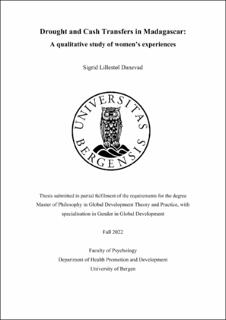Drought and Cash Transfers in Madagascar: A qualitative study of women’s experiences
Master thesis
Permanent lenke
https://hdl.handle.net/11250/3045515Utgivelsesdato
2022-11-18Metadata
Vis full innførselSamlinger
- Master theses [165]
Sammendrag
Since 2019 Southern Madagascar has experienced four consecutive years of the worst drought they have had in 40 years. Madagascar is also one of the poorest countries in the world. This, combined with existing traditional gender norms, disproportionally affects women and girls. This thesis will explore how women and girls experience the drought, focusing on marriage, pregnancies, gender-based violence (GBV) and education. It will also explore how receiving unconditional cash transfers may have improved their situation. The thesis has a qualitative approach and is based on ten individual interviews and one focus group discussion in a village in southern Madagascar. The study found that women experienced the drought and cash transfers to have several impacts on marriage, pregnancies, GBV and education. One observation is that many believed the drought had resulted in less child marriages, as men could no longer afford to pay the customary price to get married officially. On the other hand, many thought it had increased cases of GBV, due to increased social tensions. Unconditional cash transfers seemed to especially have a positive impact on the ability to attend school and access to contraception. The study gives an insight to the different ways in which women and girls experience the drought and the effects from unconditional cash transfers, and lays a foundation for future research.
